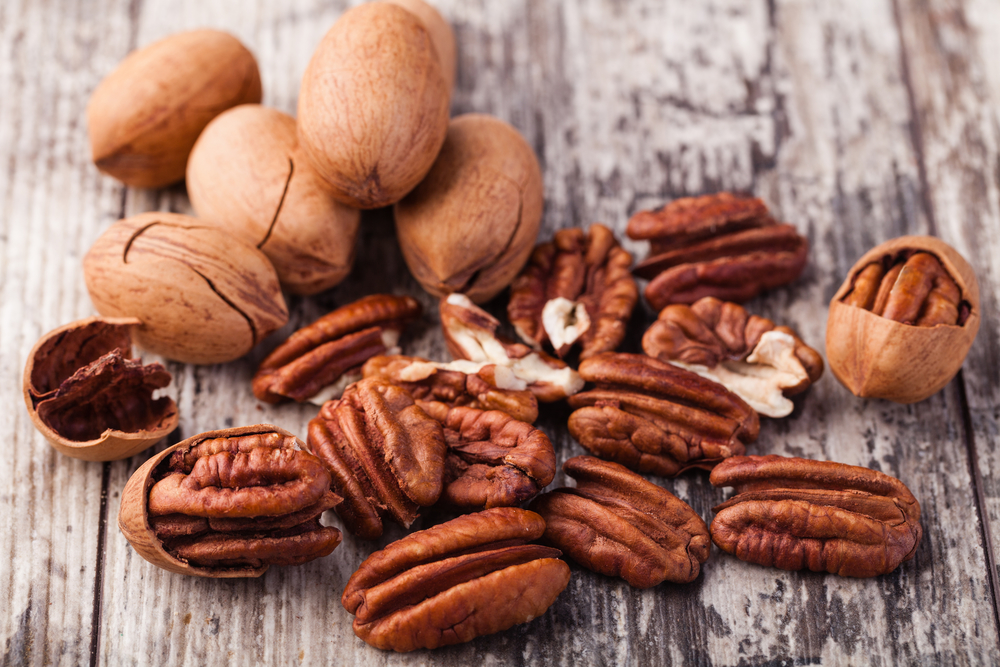The latest tropical system to impact the Southeast is expected to bring lots of rain to Georgia this week. Tropical Storm Sally is forecast to become a hurricane by tonight, according to Pam Knox, University of Georgia Cooperative Extension Agricultural Climatologist. In her blog, Knox said Tropical Storm Sally is bearing down on the Southeast and is expected to become …
USDA to Issue First Pecan Forecast for 2020
ATHENS, GA – During the last week of September, pecan growers will receive a survey from the U.S. Department of Agriculture’s National Agricultural Statistics Service (NASS). Information from this survey will be used to forecast pecan production for 2020. “The pecan industry is an important part of U.S. agriculture, especially in southern states and it is crucial for us to …
Georgia Farmers to Begin Harvesting Pawnee Pecans Next Week
Some of Georgia’s pecan farmers will begin harvesting their crop during the week of Sept. 14, according to Lenny Wells, University of Georgia Cooperative Extension pecan specialist. Wells estimates that the Pawnee pecan, which is typically the first variety harvested in Georgia every year, is on track to be picked sometime this week. “We’re usually harvesting Pawnee towards the end …
Whiteflies Impacting Georgia Blueberries
Whiteflies are not just impacting vegetables and cotton this year. According to the University of Georgia Integrated Pest Management blog, whitefly populations are impacting blueberries in Georgia. Since harvest season ended, University of Georgia blueberry entomologist Ash Sial has fielded calls of whitefly infestations in major blueberry-producing counties in Georgia. In the past, UGA blueberry experts have identified heavy infestations …
Use Resistant Varieties When Possible to Protect Against Whiteflies
University of Georgia Cooperative Extension vegetable entomologist Stormy Sparks paints an ominous picture of the potential devastation whiteflies will have on this year’s fall vegetable crop. “We’re probably a month ahead of the last two years. This is going to be challenging fall for whiteflies,” Sparks said. Vegetable producers across the Southeast have either planted or are currently planting their …
H-2A Process Should Be Smoother Next Season
The H-2A application process had its challenges this spring in getting the farm workers needed from Mexico to Florida and Georgia. Veronica Nigh, economist with American Farm Bureau, believes the process should continue to improve next season amid the coronavirus pandemic, even if a vaccine is not in place. “A good deal of uncertainty was presented both to farmers and …
Deadline is Friday, Sept. 11 to Apply for CFAP
The deadline is this week for farmers and ranchers to apply for the Coronavirus Food Assistance Program (CFAP). Producers who faced price declines and additional marketing costs due to the coronavirus pandemic and are interested in applying to receive direct payment relief need to do so by Friday, Sept. 11. According to VSCNews, more than 160 commodities are eligible for …
USTR Offers Encouraging Action for Blueberry Producers
One commodity that’s been at the center of unfair trade disputes by producers in Georgia and Florida was at the forefront of the federal agencies’ plan of action issued this week. Georgia Ag Commissioner Gary Black was pleased to see the Office of the United States Trade Representative (USTR) requesting the International Trade Commission to initiate a Section 201 global …
Collins Statement on Trump Administration Requesting Investigation into Mexico’s Unfair Trade Practices
GAINESVILLE, Ga. — Rep. Doug Collins (R-Ga.) released the following statement after the Trump Administration released a 28-page report detailing how it would address threats that increased imports pose to American producers of seasonal and perishable fruits and vegetables. The report also requested a U.S. International Trade Commission investigation into blueberry imports from Mexico, which have long harmed blueberry farmers in …
Vidalia Onion Production Meeting Next Friday, Sept. 11
The annual Vidalia Onion Production Meeting will be held virtually this year on Friday, Sept. 11, beginning at 9:30 a.m. The topics that will be covered include variety trial review, flavor updates, nitrogen fertility management and onion disease management. Everyone who wants to attend the meeting online will need to register before. Registered participants will receive a link the day …










